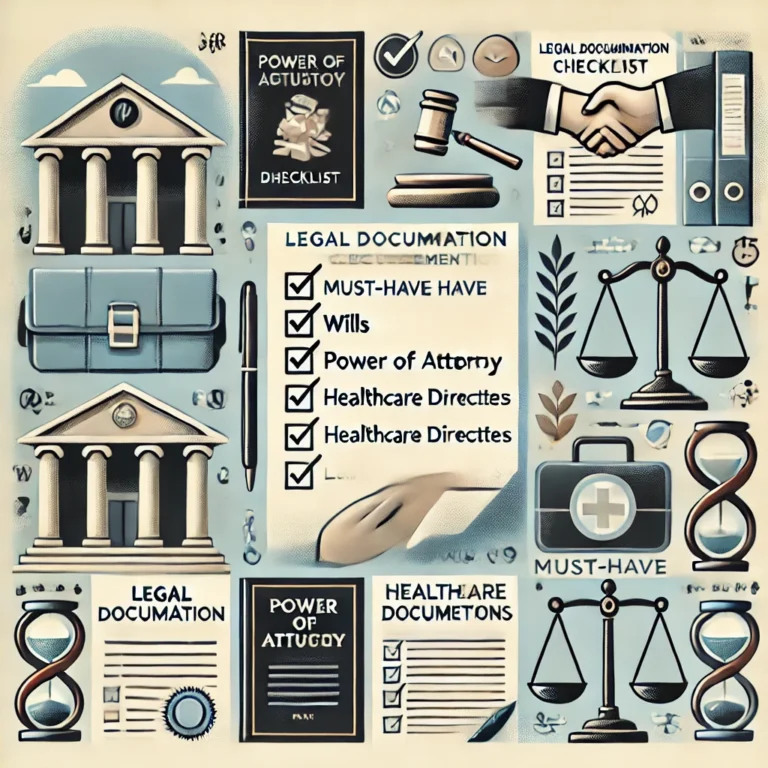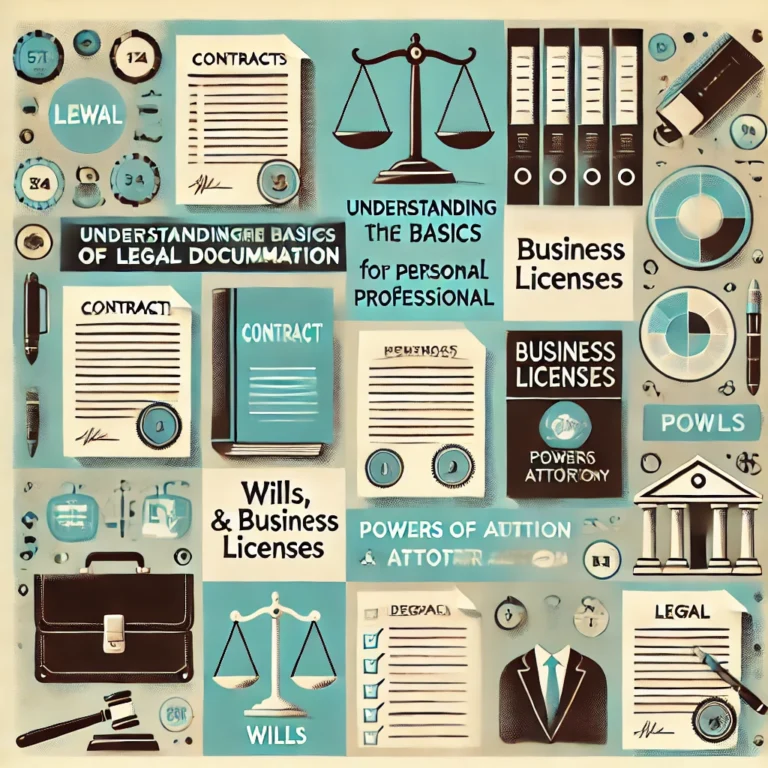Legal Documentation 101: A Complete Guide for New Entrepreneurs
Starting your own business is an exciting journey. You’ve got the idea, the drive, and maybe even a team in place. But wait! Have you considered the legal documentation you need to get your venture off the ground? Many new entrepreneurs overlook this crucial aspect, but it’s essential to the long-term success of your business. Proper legal documentation isn’t just about protecting yourself from lawsuits—it’s also about establishing a strong foundation that sets your business up for growth.
In this complete guide, we’ll walk you through all the legal documents you need as a new entrepreneur. From the moment you decide to start your business, legal paperwork plays a critical role. Let’s dive in and make sure you’ve got all your legal bases covered.
Why Legal Documentation is Important for Entrepreneurs
As a new entrepreneur, you might be thinking, “Do I really need all this paperwork?” The short answer is yes. Legal documentation serves as the backbone of your business, ensuring that you are compliant with laws, protecting your assets, and avoiding potential disputes down the line. These documents also help set expectations between you, your partners, employees, and even customers. Without them, you’re flying blind.
Imagine trying to build a house without a blueprint—it would be chaotic, right? The same goes for your business. Legal documents are the blueprints that guide your business decisions and actions.
Business Structure Documents: The Foundation of Your Company
Your first major legal decision is choosing your business structure. The type of structure you pick will determine your tax obligations, liability, and overall management setup.
- Sole Proprietorship: This is the simplest structure, but it doesn’t offer any protection for your personal assets. If the business is sued, your house, car, and other personal belongings could be at risk.
- Partnership Agreement: If you’re starting your business with a partner, a Partnership Agreement is a must. This document outlines who is responsible for what, how profits will be split, and what happens if someone wants to leave the partnership.
- Limited Liability Company (LLC): An LLC offers a good balance between simplicity and protection. It separates your personal assets from the business but is still easier to manage than a corporation.
- Corporation: If you’re planning to scale quickly or need to raise money from investors, a corporation might be your best bet. Corporations offer strong protection but come with more regulations.
Articles of Incorporation: Birth Certificate of Your Business
Once you’ve chosen your structure, it’s time to file your Articles of Incorporation (or Articles of Organization if you’re forming an LLC). This is essentially the birth certificate of your business. It includes basic details like your company’s name, address, purpose, and information about shares (if applicable).
The filing process varies depending on your state or country, but once it’s filed, congratulations—your business is now official!
Operating Agreement: The Rules of the Game
An Operating Agreement is a key document for LLCs, though it’s useful for other types of businesses as well. It lays out the internal workings of your business, such as:
- Who owns what percentage of the business?
- How will decisions be made?
- What happens if someone wants to sell their share of the business?
Think of it as a playbook that everyone agrees to follow. It prevents misunderstandings and ensures everyone is on the same page.
Non-Disclosure Agreement (NDA): Protecting Your Ideas
Let’s say you’re about to share your revolutionary business idea with a potential investor or partner. How do you make sure they don’t run off with your concept? Enter the Non-Disclosure Agreement (NDA).
An NDA legally binds the other party to keep your trade secrets and proprietary information confidential. Whether you’re dealing with suppliers, contractors, or even potential hires, having an NDA can save you from a world of trouble down the road.
Employment Contracts: Setting Expectations with Your Team
If you’re hiring employees, you’ll need to set clear expectations from day one. This is where Employment Contracts come in. These contracts cover key aspects such as:
- Job responsibilities
- Compensation and benefits
- Confidentiality agreements
- Termination terms
Even if you’re working with freelancers or independent contractors, having a clear contract ensures everyone knows what’s expected and reduces the risk of legal disputes.
Intellectual Property (IP) Protection: Guarding Your Brand
Your business’s intellectual property (IP) could include your brand name, logo, product designs, or even proprietary technology. Protecting your IP is crucial if you don’t want others to profit off your hard work. Here are a few key documents:
- Trademark: Protects your brand name or logo.
- Patent: Secures your inventions or unique processes.
- Copyright: Safeguards original works, like written content or software.
Filing for IP protection can be a bit complicated, but it’s a critical step to ensure that no one steals your ideas.
Business Licenses and Permits: Staying on the Right Side of the Law
Many new entrepreneurs forget about this one, but without the proper Business Licenses and Permits, you could face hefty fines or even forced closure. Depending on your industry and location, you may need local, state, or federal licenses to operate legally.
For example, if you’re opening a restaurant, you’ll need health department permits. Running an e-commerce business? You might need a seller’s permit. Always check the specific requirements for your business type.
Terms and Conditions (T&Cs): Setting Rules for Your Customers

If you’re selling products or services online, your Terms and Conditions (T&Cs) document is crucial. This sets the rules for how customers can use your products or services, as well as your refund and return policies. Think of it as the fine print that can save you from misunderstandings or legal issues with customers down the road.
Privacy Policy: Protecting Customer Data
In today’s digital age, customer data privacy is a big deal. A Privacy Policy informs your customers about what data you’re collecting, how it will be used, and how it’s protected. Many countries, including the U.S. and those in the EU, have strict data privacy laws, so having this document isn’t just a courtesy—it’s often required by law.
Service Level Agreement (SLA): Defining the Quality of Service
If you’re offering any kind of service, you’ll want to create a Service Level Agreement (SLA). This document sets the standards for the quality of service you’ll provide. It outlines what happens if you don’t meet those standards and can help manage customer expectations.
For example, an IT company might promise 99% uptime. If they fail to deliver, the SLA might state that the customer gets a discount or other form of compensation.
Shareholder Agreements: Managing Investor Relationships
If your business has shareholders, a Shareholder Agreement is a must-have document. It outlines the rights and obligations of each shareholder and clarifies how decisions will be made regarding the business.
This document can help prevent conflicts down the line, especially if there’s ever a disagreement about how the business is being run.
Vendor Contracts: Ensuring Smooth Transactions with Suppliers
Whether you’re purchasing raw materials, outsourcing production, or working with marketing agencies, you’ll need Vendor Contracts. These contracts outline the terms and conditions of your agreement with third-party suppliers, ensuring both parties are protected.
The last thing you want is a misunderstanding with a key supplier that halts production. A clear vendor contract can help avoid that.
Loan Agreements: Safeguarding Your Finances
If you’re borrowing money to fund your startup, you’ll need a Loan Agreement. This document details the terms of the loan, including interest rates, repayment schedules, and collateral.
Whether you’re borrowing from a bank, investor, or even a family member, it’s essential to have the loan agreement in writing. It protects both parties and ensures everyone knows the repayment expectations.
Tax Documents: Staying Compliant with the IRS
Ah, taxes—the necessary evil. Depending on your business structure, you’ll need to file different types of tax forms. As a new entrepreneur, it’s important to work with an accountant to ensure you’re filing everything correctly.
You may need to file quarterly tax returns, pay self-employment taxes, or issue W-2s for your employees. Staying compliant with tax regulations is crucial, as penalties for mistakes can be steep.
Conclusion: Don’t Skip the Legal Documentation
It’s easy to get swept up in the excitement of starting a new business, but skipping out on essential legal documentation can be a costly mistake. Whether it’s setting up the right business structure or protecting your intellectual property, having the right legal documents in place is crucial to the success of your venture.
Starting with the foundation—your Articles of Incorporation and Operating Agreement—will ensure that your business is built on solid ground. From there, NDAs, employment contracts, and SLAs will protect your interests as you grow. By proactively handling legal paperwork, you’re not just protecting yourself—you’re setting your business up for long-term success.
So, take the time to get your legal house in order. It might not be the most exciting part of being an entrepreneur, but it’s one of the most important!
FAQs
1. What is the most important legal document for a new business? The most critical document is your Articles of Incorporation (or Organization, for LLCs), which legally establishes your business.
2. Do I need a lawyer to draft my legal documents? While it’s not always required, having a lawyer draft or review key legal documents can save you from potential legal issues down the road.
3. What happens if I don’t have an Operating Agreement? Without an Operating Agreement, your LLC may be subject to default state laws, which might not reflect your business’s specific needs.
4. Is a Non-Disclosure Agreement (NDA) necessary for every business? Not every business needs an NDA, but if you’re sharing proprietary information, it’s wise to have one in place.
5. How often should I update my legal documents? It’s a good idea to review your legal documents annually or whenever significant changes occur in your business.







